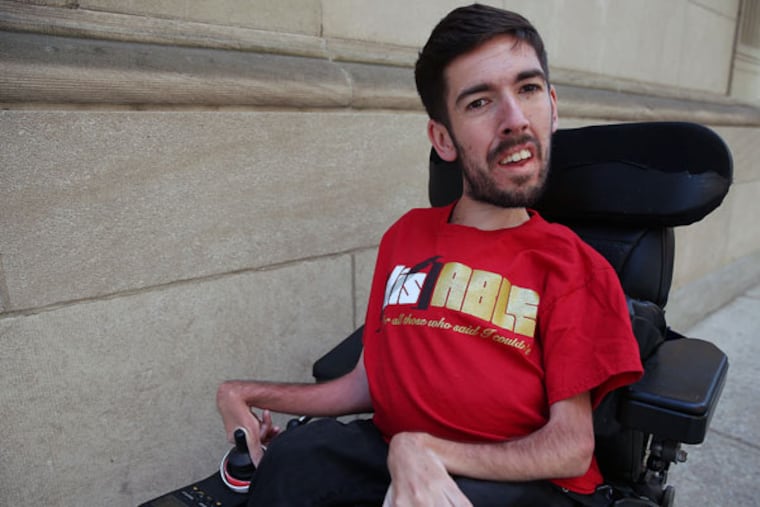Temple grad won't be defined by his [dis]ability
It started with a logo - something Jimmy Curran thought captured the driving belief of his life: that no one should be defined by their limitations.

It started with a logo - something Jimmy Curran thought captured the driving belief of his life: that no one should be defined by their limitations.
He sketched it on a piece of paper: [dis]ABLE. The [dis] has a strike through it.
Underneath, he wrote: For all those who said I couldn't.
To Curran, who has been in a wheelchair nearly all of his 26 years, the meaning was simple as it was universal: We all have limitations. And we all have the ability to disable those limits, to overcome them.
This is something Curran knows firsthand.
The Temple grad lives with spinal muscular atrophy, a genetic disorder that affects control of muscle movement. He's been in a wheelchair since he was 2 years old.
When he was a kid in Plymouth Meeting, his condition didn't keep him from having his mother drive him to Philly for music competitions where he would perform his rap songs.
It didn't keep him from graduating from Temple with honors in finance - or from a thriving social life and the confidence to dub himself "Hot Wheels." From top-notch internships on Wall Street and Capitol Hill and a Center City apartment. From landing a research analyst position at Independence Blue Cross four years ago.
Or, when he got that job, from fighting to expose the bureaucratic mistakes that nearly cost him the home-health assistance he needs to live independently.
"My disability has not defined me," Curran said the other afternoon during a work break. "Because I have made the choice to not allow it to stop me from accomplishing my goals."
And that's how Curran sees his purpose in life: changing misconceptions.
"I wouldn't change anything about my life," he said. "I wouldn't change being in a wheelchair. While it hasn't defined me, it has influenced my perspective on life, and I wouldn't change my perspective for anything."
That self-assuredness was what struck Temple basketball coach Fran Dunphy when Curran struck up a conversation with him one day at a campus restaurant. The two quickly became friends.
"Jimmy is going to lead a good life and not be burdened by anything he can't do - because he knows all that he can do," Dunphy told me. "He inspires me."
And though Curran believed he was making an impact at his job, and with his friends and family, he wanted something bigger - the ability to influence more people. And he loves fashion.
So about a year and a half ago, he sent his logo off to a T-shirt company. He got one shirt made. He posted a photo of it on Facebook and Instagram.
"If anyone is interested in purchasing one, let me know," he wrote.
The response, he said, "was crazy."
"I got such a positive response from my social network and then it just blossomed," he said.
He ordered more shirts and expanded into tank tops, hoodies, hats, and long-sleeved Ts. A natural networker, he carried a duffel bag of merchandise around on his chair. To promote the brand, the message.
His home-care assistance company bought 50 shirts. Families with disabled loved ones bought the T-shirts and posted pictures.
Last year, Curran's close college friend Eddie Doyle came on as a partner. They displayed shirts at LeSean McCoy's charity celebrity basketball game. McCoy bought one. So did the rapper Nelly and New York Jets all-pro defensive end Muhammad Wilkerson - another college buddy of Curran's.
They have sold about 1,500 shirts. They go for $20.
Now, Curran and Doyle are launching a Kickstarter campaign in hopes of raising $45,000. The goal is to expand the brand to include children's clothing, children's books, and to eventually use the website disablethebrand.com as a platform for short films and documentaries on disabled people overcoming limitations. Three percent of the profits will go to charitable organizations that work with the disabled.
"My hope is that I am able to touch as many lives as possible, and show people that disabled in its traditional form has no meaning," he said.
It's pretty clear he's achieving that goal.